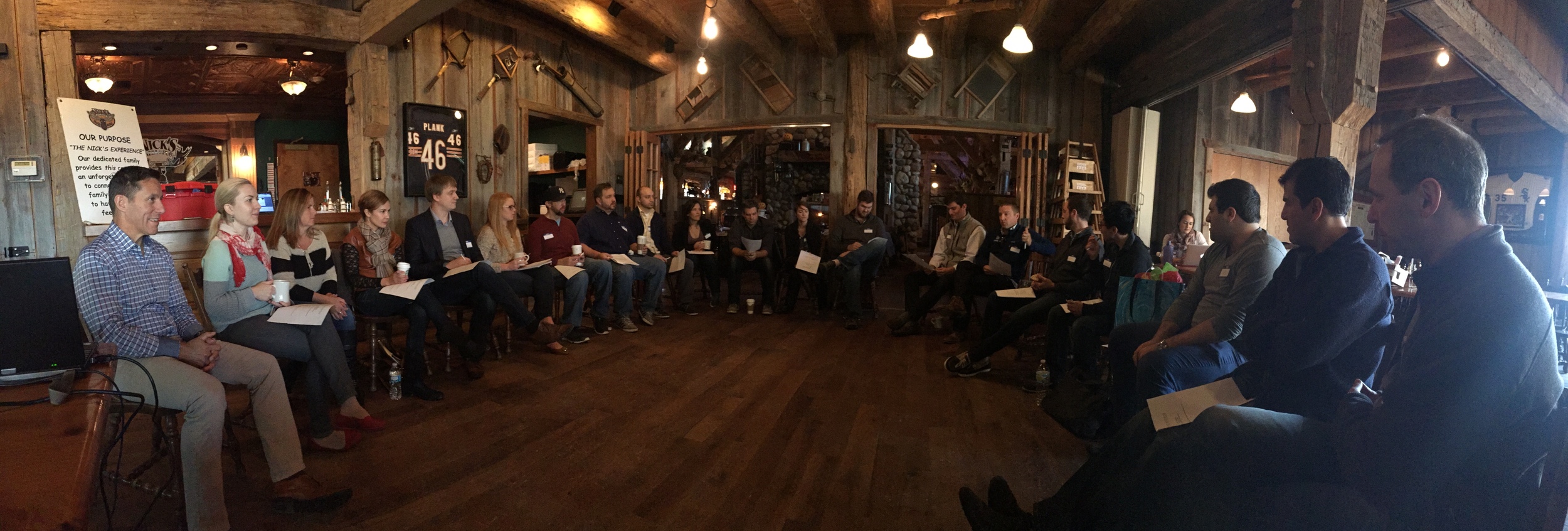Raman Chadha, Founder and Partner of The Junto Institute and founder and former Executive Director of DePaul University’s Coleman Entrepreneurship Center, is sharing his extensive experience with entrepreneurs and giving us practical advice to improve our emotional intelligence and our mentorship skills.
Transcripts:
| Adam Robinson: | Welcome to the Best Team Wins podcast where we feature entrepreneurs and business leaders whose exceptional approach to the people side of their business has led to incredible results. My name is Adam Robinson and for the next 25 minutes I’ll be your host as we explore how to build your business through better hiring. Today on the program Raman Chadha is the founder and partner of the Junto Institute For Entrepreneurial Leadership. He founded that in 2012. It is a bootstrap business. He’s got four employees, and also founded Coleman Center for Entrepreneurship at DePaul University. Raman, we’re excited to have you on the show. |
| Raman Chadha: | Thank you, Adam. Happy to be here. |
| Adam Robinson: | Here are the Best Team Wins. We know that the best learning happens through the sharing of real experiences from fellow entrepreneurs and leaders and we’re going to learn a lot from you today. But first we’re going to start off on the right foot as is the tradition here on the podcast. We always start off with the best news, business or personal, that happened to you in the last seven days. Raman, what is your right foot for last weeK? |
| Raman Chadha: | Haha, love it. This past week, my right foot is that we had a successful open house on Monday evening and we actually had one company that agreed to enroll in the next cohort of the Junto Institute as a result of that. |
| Adam Robinson: | Congratulations. |
| Raman Chadha: | Thank you. |
| Adam Robinson: | All right. Very quickly, what is the Junto Institute? |
| Raman Chadha: | Junto is a leadership and revenue accelerator for growth-stage companies through which their founders and their leaders develop their emotional intelligence, leadership skills and decision-making abilities. |
| Adam Robinson: | Where can listeners find out more about what you’re doing at Junto. |
| Raman Chadha: | They can go to thejuntoinstitute.com and Junto is spelled J-U-N-T-O. |
| Adam Robinson: | Okay. Thanks for that. Let’s talk about the people side of your business. On your blog you write about love and hugs and emotions, which can be scary words for people in their professional lives. Maybe even their personal lives. Can you tell us about how these words are at work in your business and what they have to do with your business at Junto? |
| Raman Chadha: | Yeah, most certainly. One of the hallmark of Junto is the community, what we call “the Junto tribe,” and there’s a great deal of interconnectivity and a high level of interpersonal relations that occur within that and so as a result one of the ways that love and hugs and emotions lives is virtually everybody at Junto hugs each other. It is something that has evolved over the years more as a result of familiarity and relationship-building. We do that in our team as well. We are not uncomfortable giving hugs to each other. Not every single day, but on a regular basis. |
| Every week in our weekly huddles we incorporate appreciations. We find ways to express love for ourselves, for the business, and for our teammates. We also use something called the “emotion wheel,” which is used as a way to prompt how we’re feeling at different times during the week and it is something we use in our weekly huddles. | |
| We also use it in our forum sessions, which allows people to stop for a moment and share what they’re feeling at that moment in time, which does two things. Number one, it elicits self-awareness which in the moment sometimes we’re not all very good at doing and then secondly it also enables empathy to occur, so that way if I hear how my teammates are feeling at the moment, it allows me to get a little bit of a window into how they might be for that day or that week. Those are some of the ways we incorporate those things. | |
| Adam Robinson: | Okay. Let’s talk about emotional intelligence for a second. Why do you feel it’s important in general to entrepreneurs and business leaders? |
| Raman Chadha: | First of all is the fact, and I use the word ‘fact’ intentionally, we’ve seen a number of scholarly studies over the last 20 years that have positively linked one’s emotional intelligence with one’s leadership effectiveness. In my experience, we entrepreneurs are de-facto leaders. While we may not be great leaders and people might continue to follow us, which tends to happen in companies that have turnover issues, we’re all leaders to a great extent. If emotional intelligence has been proven to be an effective indicator of leadership, we believe that it was important that for a leadership development program we incorporated the idea of developing emotional intelligence skills. |
| We have a series of skills and habits that our participants practice during the program so they become better at that. The second reason is that there, again, scholarly studies have demonstrated a higher incidence of learning disorders and behavioral disorders amongst entrepreneurs. | |
| Adam Robinson: | No kidding? |
| Raman Chadha: | While that doesn’t suggest that every one of us has those, while I think most of us would argue that we do, the idea is that developing emotional intelligence has been shown to actually mitigate many learning disorders and behavioral disorders and so that, then, just allows these entrepreneurs to become simply better human beings and if they can be better human beings, that transfers into their businesses on a day-to-day basis for them to become leaders. |
| Adam Robinson: | How can our listeners implement emotional intelligence in their business tomorrow? How do you make this practical?
|
| Raman Chadha: | That’s really hard. I will share with you two things that can be simple behaviors that you can practice literally after listening to this podcast. One is what we call, “stop, look, and listen,” which is a very simple framework for being a better listener, and just like we learned about stop, drop, and roll when we were young back from our parents and firefighters, stop, look, and listen is a simple one where we sort of first to stop what you’re doing right now. Whatever interaction that you’re having with someone else, stop what you are doing, thinking, looking at your phone, looking at your laptop, contemplating something, the look is look them straight in the eye. Make eye contact with that person to prove that you are capable of listening to them. |
| We don’t realize that eye contact is the only indicator that we have that someone is actually listening to us. I can be thinking about something while I’m looking someone in the eye, but that person doesn’t know that I am thinking, but when I’m not looking them in the eye, they’re wondering whether I am listening or not. Then last is listening attentively, listening with their whole body, facing them shoulder to shoulder, making eye contact with them and giving them positive feedback that they are being listened to through nods, through smiles, through even some verbal gestures that aren’t words. | |
| The second thing is delivering sincere compliments. That’s one way of practicing emotional intelligence is just being able to acknowledge people for who they are, giving them a sincere appreciation, not saying ‘you did a good job’, but instead ‘I want to tell you that yesterday I overheard you speaking to this customer on the phone and I really appreciated how you listened to them on the phone and how at the very end you summarized the conversation and told them that we thank them for the business.” People, then, know that we’re paying attention to the little details and it is a sincere compliment because it’s coming from our heart and it’s not just a throwaway ‘good job’ or ‘attaboy’. Those are two ways that they can practice. | |
| Adam Robinson: | Okay. Yeah. Very good. One of the things I’m most excited about for this episode, you’ve worked with hundreds I know, maybe over a thousand. I’m not sure, but you have touched so many entrepreneurs over the last 15 to 20 years that you’ve been in the business of educating entrepreneurs. What would you say are the biggest people-related challenges entrepreneurs are facing that are coming through the cohorts at Junto Institute? |
| Raman Chadha: | It’s funny, Adam, because I don’t know if it’s any different from … I don’t know if Junto companies are any different than other companies. I think they just might be a little bit more aware on average, but the biggest people-related challenges are related to culture, building a great culture and a culture that is identifiable and can be articulated. Secondly, alignment and communication, making sure that people on the leadership team and all the other employees in the company, everybody is aware of what is happening in the company and what the priorities are for the business and how everybody can be or should be rowing in the same direction as a team. |
| Obviously, as the whole idea of hiring and firing and that was where the decision-making comes in. We all here the adage of ‘hire slow and fire fast,’ which is a terrific soundbite but very hard implement and so that is something that our companies are very aware of. They work on very hard, but they’ll be the first ones to tell you like any improvement process it takes them a while to become better and they’re never really achieving perfection with it. Those are some of the things that are the biggest people-related challenges. | |
| Adam Robinson: | Okay. You mean in the business you’re in, mentorship is everything. I know it means a lot to you. You’re personally passionate about it. How can someone be a good mentor? I’m thinking, of our listeners who are hiring less experienced, let’s say entry level or high-potential employees and molding them to be the future of a business that they may be working on, how can somebody be a good mentor? What’s your experience that you can share for how you can put that in practice. |
| Raman Chadha: | I’ll share the experience of having mentored many, many people over the years and then secondly having built our mentorship program at Junto. That is built on questions, listening, discovery, and shared experiences and so we believe that mentorship is not telling someone what to do or giving advice to them. We believe that mentorship is exploring someone’s journey by asking them questions, by listening very, very intently and actively and showing them that they’re being listened to, by sharing experiences and so when someone asks a question to the mentor, “How should I go about doing this?” Or “What should I do in this situation?” Or “What decision should I make?” Rather than responding to the question literally, instead responding to it figuratively by saying, “I’m not quite sure what you should do, but let me share with you an experience that comes to mind that was triggered by your question and how I approached it. |
| All of that, then, leads to this process of self-discovery where people, the mentees, are enabled to start making their own decisions and figure out what they should do and then they take responsibility for that decision. | |
| Adam Robinson: | Okay. After seeing so many teams coming through Junto and prior through the DePaul Coleman Entrepreneurship Center, I’m thinking about this notion of leadership teams. What have you seen as the common threads in successful teams or more productive teams versus unsuccessful less productive teams? |
| Raman Chadha: | Two things. First of all it’s communication. I have a personal belief that miscommunication and lack of communication is the source of every problem in life. |
| Adam Robinson: | Okay. |
| Raman Chadha: | That, to me, is something that is essential for a successful leadership team that they know how to communicate, when to communicate, what to communicate and why to communicate. The second thing is it’s the old adage that ‘what got us here won’t get us there,’ and the idea there that just because a startup team is successful at a certain point in time, doesn’t necessarily mean that it will be successful in the future only because some people don’t have the capacity to grow with the business. We hear about companies that are outgrowing individuals. We also hear about individuals that are outgrowing companies and so if that happens on an individual basis, then it’s most likely going to effect the dynamics of the leadership team as a whole. |
| Adam Robinson: | Is it obvious to you having seen so many of these situations when an organization is working with you that one of the members is not pulling their weight or doesn’t fit? It’s gotta just jump right out at you. |
| Raman Chadha: | It does. It doesn’t necessarily jump out, Adam, but it emerges in the process. Yeah. Back to that whole idea of discovery. |
| Adam Robinson: | Do you find that through that process the person typically becomes self-aware and understands they have that issue or are you typically having to have sidebar conversations or suggest that the CEO of your cohort company has that conversation? |
| Raman Chadha: | I wish it was always something that is self-identified, but it isn’t always and, yeah, sometimes there has to be, dare I say, an intervention or a very difficult conversation. That happens a lot. Especially in the first three months of our program. There were a lot of really hard conversations. |
| Adam Robinson: | Okay. That’s good though. That’s part of the value I am sure. Let’s talk a bit about your organization now. Let’s put you in the hot seat a little bit. Walk us through the Junto Institute’s core values. What are they and what do they mean? |
| Raman Chadha: | There’s seven of them. The first one … And they’re not in any particular order. The first one is that we practice what we teach and preach. The idea there is that if we’re a leadership development program for growth-stage companies which is what we are, then we want to make sure that we’re role modeling positively and that we’re building a business that reflects what our companies are learning in the program. That’s really important for our team who might not be a seasoned business people to see that we’re literally walking the talk. |
| Number two is that we create remarkable experiences through ingenuity, high standards, overt communication and details. We take that word ‘remarkable’ very seriously and very literally. We want people to be talking about going through the Junto Institute and so as a result we pay a lot of attention to communicating in varied amounts of detail on a regular basis and setting high standards for ourselves to meet. Third is we balance autonomy and ownership with responsibility and discipline and that means that it doesn’t matter to us where anybody works as long as they get the work done. It doesn’t matter to use that they are coming to us with ideas or not with ideas as long as it fits what’s right for the business. | |
| Fourth is that we push ourselves and our tribe to attempt reaching new heights. We want people to be learning. We want them to be curious. We want them to experiment. We want them to fail.
Fifth is we create safe and trusting environments for people to be themselves. Creating the opportunity for people to bring authenticity to the table. Sixth is that we treat everyone with high touch and love as if they are the only one. We’re in the people business and we want every single person who’s in Junto to feel that they’re a part of the community but, at the same time, that they’re an individual human being. Lastly is that we nourish our physical, mental, and emotional well-being and support that in others and that one hopefully is self-explanatory. |
|
| Adam Robinson: | Yeah. Excellent. What are you doing to communicate those and promote those internally? Those are fantastic. They’re detailed. How do you live those? |
| Raman Chadha: | We live them every day. Back to our weekly huddles, actually every single week in our Monday morning huddles we articulate each of the values. Secondly, on a daily basis we provide feedback to each other and so our employees will provide feedback to me when they identify that I am living a value or not living a value. If somebody asks why we’re doing something, we always tie the answer back to one of our values, and so when we’re onboarding a new employee we get that question ‘why?’ an awful lot. The values have given us a very simple framework and it depersonalizes it so it’s not about me. It’s not about my business partner. It’s about the company’s values. |
| Lastly is when we’re explaining the work to somebody it also allows us to back it up when we say, “The reason that we’re going through these steps is because it integrates these three values and all of a sudden they’re able to start understanding why we take that approach. | |
| Adam Robinson: | Okay. Our listeners love to hear about what I call the ‘people model.” That’s the business model that governs the people inside your business. For example, are you hiring entry level high-potential hires and investing a lot in training and development or are you spending more to hire experience in specialized skills? Take us through it. |
| Raman Chadha: | Yeah. We’re still a small growing business and so we’re focused more on entry level and maybe early mid level, lower mid level. We invest immensely in mentorship training and development even though we’re a small team and that starts with day one. Secondly, they go through our program and so they’re getting exposed to a lot of the same learning that these fast growing companies are exposed to. We look for alignment with our values and that’s how we hire very slowly is we want to make sure that they are aligned with our values so all of our questions that we ask while they’re also behavioral in nature, they’re very targeted to uncover whether they believe the same things that we believe. |
| Adam Robinson: | Has that changed over time or has that been consistent for you? |
| Raman Chadha: | At its core it’s been consistent but every single time we are ready to hire someone, we get better at it and as we learn from the people who work with us, we also get better at it. My business partner and I are always adapting and iterating. |
| Adam Robinson: | As you look to the future then with this model, armed with this model, armed with these core values, in what ways are you planning on scaling your growing organization? |
| Raman Chadha: | Right now, what we’re planning to do is hoping to replicate our program in another city in the US. That’s one way we’re gonna do it. We’re looking at different ways that we can leverage technology in order to grow and scale and then also back to this idea of our people is developing our people in an accelerated fashion so that they can take on a greater amount of work without having to necessarily work more. |
| Adam Robinson: | Okay. That’s great. All right. It is time for the lightning round. We’re going to ask you a couple of quick questions. We like to take the barometer of our guest here and see where you think the wind is blowing. Question number one, do you think US economy is going to get better or worse over the next 12 months? What are your entrepreneurs saying? |
| Raman Chadha: | Better. |
| Adam Robinson: | Better. All right. Do you think it’s going to get harder or easier to find the people that you need over the next 12 months. |
| Raman Chadha: | Easier. |
| Adam Robinson: | Easier? Okay. |
| Raman Chadha: | Yes. |
| Adam Robinson: | Okay. On your nightstand what book are you reading right now and would you recommend it to our listeners? |
| Raman Chadha: | Yeah, I’m actually between books. One book that I just finished last week is called Becoming Wise by Krista Tippett, which completely changed the way that I look at the world around me and then I just began reading Between the World and Me by Ta-Nehisi Coates, which has given me a great deal of empathy, not just for the people that he writes about but for every other human being. |
| Adam Robinson: | Absolutely. That’s great. All right. Closing question here. If you were to come back on this show a year from now and report on whether or not you accomplished the most important thing on your plate right now, what is that thing? |
| Raman Chadha: | That we successfully expanded to a two-hour program at our second city. |
| Adam Robinson: | That’s the final word. You’ve been learning from Raman Chadha, founder and partner of the Junto Institute For Entrepreneurship. Raman, thank you for being with us on the program today. |
| Raman Chadha: | You’re welcome, Adam. Thank you for having me. |
| Adam Robinson: | That’s a wrap. For this week’s episode of the Best Team Win’s podcast where we feature entrepreneurs and business leaders whose exceptional approach to the people side of their business has led to incredible results. I’m Adam Robinson, author of the book The Best Team Wins which you can find online at www.thebestteamwins.com. We will see you next week. |



